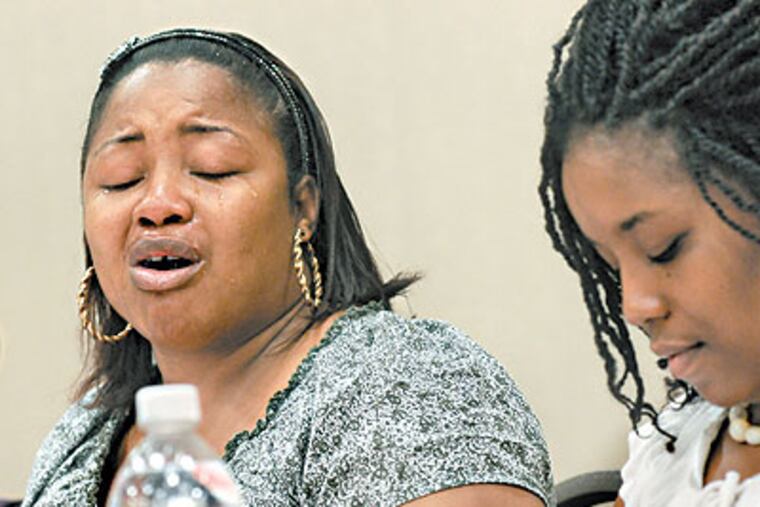Forum focuses on children with parents in prison
John Campbell was 5 when his mother dropped him off at his grandmother's house and said she'd be back.

John Campbell was 5 when his mother dropped him off at his grandmother's house and said she'd be back.
"She didn't come back for 10 years," said Campbell, 27, of Pine Hill.
Campbell's mother, who struggled with an addiction to crack, spent that decade in and out of jail. Even when she was released and took Campbell and his younger brother to live in Camden, it wasn't long before she left the rent unpaid and the kitchen bare while she went out looking for drugs, he said.
Campbell, like the estimated 2.7 million children in the country who now have a parent in prison, struggled with shame and frustration, trying to make his way with both his mother and father in prison for drug crimes. On Thursday, he and three other adult children with incarcerated parents spoke about the issue during a daylong forum at Rutgers-Camden.
"For far too long, people have just not thought about all the ripple effects of what happens when you lock people up," said Jane Siegel, chair of the sociology, anthropology and criminal justice department at the university. Siegel, an associate professor, has just published the book Disrupted Childhoods: Children of Women in Prison.
Campbell put it another way.
"Those boys become men," he said in an interview. "We have to care about these kids."
The four on the panel said visiting and talking by phone with their parents were vital to helping them maintain a relationship. They also told the audience of about 50 that it is important to help children of incarcerated parents recognize that they won't necessarily follow in their parents' footsteps.
"The apple doesn't fall far from the tree, but you've got to keep rolling," Campbell said in an interview. "We're strong enough to keep rolling when you fall from that tree."
Pennie Oliver, 35, said she recalled the day her mother was arrested 19 years ago. Oliver's mother, Sylvia Boykin, is serving life without parole for murder. Prosecutors said Boykin, then a drug dealer, ordered a hit on a 43-year-old woman who owed her $75 for crack.
On the day of Boykin's arrest, Oliver, then 16, was in high school in Strawberry Mansion. The principal told her to turn in her books and leave school, saying she and her two sisters were a danger to the other students, Oliver told the audience.
By her senior year, Oliver had a son of her own, and she stopped going to school to pal around with the child's father, who was dealing drugs, she said.
But a couple of persistent teachers came to her home and urged her to finish.
Now a bank teller living in Manayunk, Oliver said she was grateful to those teachers. She urged other children in similar positions to stick with school.
"Go to school, go with your plan," she said. Her greatest triumph, she told them, was "surviving."
One of Oliver's younger sisters, Tisha, was 12 when their mother was arrested. It sent Tisha into a deep depression, and social workers helping the family made sure Boykin knew.
"My mother would always call home and ask me what was wrong," Tisha Oliver, now 33, told the audience, breaking into tears. "It really helped my mother be a mother to me."
Brian Lee, 20, of Camden, said his father's addiction to crack had kept him in prison for most of his life. Lee still wants a relationship with his father, and he finds it frustrating that they are kept separate during visits.
"I'm going home without my father, and I don't even get to give him a hug?" said Lee, who graduated as valedictorian from Woodrow Wilson High School and is now studying English at Rutgers.
For Campbell, his mother's release did not make his life any easier. When food became scarce, Campbell dropped out of school, working first at a McDonald's and later dealing drugs to pay the rent and feed himself and his 8-year-old brother, he said. When child services intervened, Campbell spent several years in group homes and in foster care.
But then, at 17, Campbell decided he wanted to help children like himself. He got his GED and found work. He attended Camden County College and later Rowan University, where he received a bachelor's degree in applied sociology. This year, he received a master's degree in criminal justice from Rutgers. He is a clinical case manager for Burlington County.
Campbell's mother, too, has changed. She has been clean for six years, Campbell said.
His advice to children of incarcerated parents is to recognize their own worth, and "hold on for the ride."